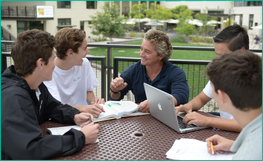
Pacific Ridge School in Carlsbad, California, has implemented programming that promotes tech fluency, while simultaneously teaching behavioral self-awareness in the realm of tech use.
Pacific Ridge’s Director of Student Life, John Comforto, launched a school-wide survey last year and found that, like many students across the country, a majority of middle school students were doing at least one other activity while doing their homework. Generally, these activities involved screen time.
In an effort to minimize distractions, this fall Head of Middle School Hans Richter introduced an experiment called ONEtober. For the month of October, students were challenged to quit multitasking by turning off Netflix, music and social media notifications in timed increments while completing homework. Knowing that students aren’t the only ones affected by screen time’s addictive allure, parents were invited to participate as well and talk with their children about the experience.
After finishing the challenge, 42 percent of the middle school students agreed that multitasking increases errors. More than 80 percent of students also said there was a probability that multitasking when doing homework increases the time it takes to complete it. Mr. Richter reports that since ONEtober, he has seen a positive change in students’ study behaviors and parents have expressed appreciation for helping them address the tech-use challenges their families face at home.
In addition to specific projects like ONEtober, Pacific Ridge uses a teaching method called Harkness that encourages the kind of face-to-face, real world connection that teenagers miss in a culture dominated by online communication.
In Harkness classrooms, students sit around an oval table alongside their teacher. They are encouraged to discuss the material being studied, while refining their ideas and opinions in dialogue with their classmates. The teacher guides the discussion, helping students clarify their arguments and consider different perspectives. Among the educational goals of Harkness are the development of critical thinking, listening and speaking skills. Starting in middle school, students learn how to participate in active and engaging discussion.
Mr. Richter said the Harkness method helps students connect offline, even though technology is ever-present and is often incorporated into Harkness discussions.
“Technology does offer opportunities for less-focused students to drift, but those opportunities are always present in school settings, and the Harkness method helps draw everyone into the discussion,” said Richter.
Another extremely important connection-building experience at Pacific Ridge is the global travel program the school runs at the end of the academic year.
In late May and early June, nearly the entire student body travels domestically and internationally for academic study, cultural immersion and service. During this time, students are allowed very limited use of their cell phones to keep them directly engaged with their travel experiences. These range from exploring American history in Washington, D.C., to living with a host family in a tiny Moroccan hillside village and meeting with non-governmental aid workers who support victims of human trafficking in Thailand.
Last year, after a trip to Thailand, Pacific Ridge senior Reese Jessup founded a service group to raise awareness about human trafficking. Now, during the school day, she and her group members fundraise to help support human trafficking victims. According to the students, they would not have been able to understand the scope of the problem had they not spoken directly with non-governmental workers or visited cafes where recovering victims work. Yet, technology allows them to easily keep in touch with the aid workers they met and who they now support.
Richter said this type of connection is invaluable.
“Technology in all its forms should be a tool for growth and enhancement, not a replacement for real relationships. When we pair technology with powerful human connections, it plays an important, supporting role and the opportunities for learning are endless," said Richter.
About Pacific Ridge School:
Opened in the fall of 2007, Pacific Ridge School is a non‐profit, independent middle and high school located in the North County, San Diego. With the distinctive mission of building a community that fosters academic excellence, ethical responsibility and global engagement, Pacific Ridge offers a first-rate educational experience to prepare students for college and a purposeful life. For more information, visit http://www.pacificridge.org. Pacific Ridge School does not discriminate on the basis of religion, gender, sexual orientation, race, creed, or national origin in the administration of its educational policies, admissions policies, and other administered programs.
Image: Hans Richter, Head of Middle School at Pacific Ridge School, talks with students about digital citizenship.












